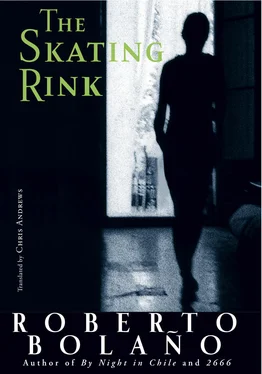Roberto Bolano - The Skating Rink
Здесь есть возможность читать онлайн «Roberto Bolano - The Skating Rink» весь текст электронной книги совершенно бесплатно (целиком полную версию без сокращений). В некоторых случаях можно слушать аудио, скачать через торрент в формате fb2 и присутствует краткое содержание. Год выпуска: 2009, Издательство: New Directions, Жанр: Современная проза, на английском языке. Описание произведения, (предисловие) а так же отзывы посетителей доступны на портале библиотеки ЛибКат.
- Название:The Skating Rink
- Автор:
- Издательство:New Directions
- Жанр:
- Год:2009
- ISBN:нет данных
- Рейтинг книги:5 / 5. Голосов: 1
-
Избранное:Добавить в избранное
- Отзывы:
-
Ваша оценка:
- 100
- 1
- 2
- 3
- 4
- 5
The Skating Rink: краткое содержание, описание и аннотация
Предлагаем к чтению аннотацию, описание, краткое содержание или предисловие (зависит от того, что написал сам автор книги «The Skating Rink»). Если вы не нашли необходимую информацию о книге — напишите в комментариях, мы постараемся отыскать её.
oscillates between two poles: a camp ground and a ruined mansion, the Palacio Benvingut. The story, told by three male narrators, revolves around a beautiful figure skating champion, Nuria Martí. When she is suddenly dropped from the Olympic team, a pompous but besotted civil servant secretly builds a skating rink in the ruined Palacio Benvingut, using public funds. But Nuria has affairs, provokes jealousy, and the skating rink becomes a crime scene. A mysterious pair of women, an ex-opera singer and a taciturn girl often armed with a knife, turn up as well.
A complex book,
’s short chapters are skillfully broken off with questions to maintain the narrative tension:
All of these questions are answered, and yet
is not fundamentally a crime novel, or not exclusively; it’s also about political corruption, sex, the experience of immigration, and frustrated passion. And it’s an atmospheric chronicle of one summer season in a seaside town, with its vacationers, its drifters, its businessmen, bureaucrats and social workers.
The Skating Rink — читать онлайн бесплатно полную книгу (весь текст) целиком
Ниже представлен текст книги, разбитый по страницам. Система сохранения места последней прочитанной страницы, позволяет с удобством читать онлайн бесплатно книгу «The Skating Rink», без необходимости каждый раз заново искать на чём Вы остановились. Поставьте закладку, и сможете в любой момент перейти на страницу, на которой закончили чтение.
Интервал:
Закладка:
Gaspar Heredia:
Until El Carajillo fell asleep we talked about women
Until El Carajillo fell asleep we talked about women, food, work, children, illness and death. . When I heard him snoring, I switched off the light in the office and went outside to pursue my reflections. At dawn I went back into the office, told El Carajillo there was nothing to report, and said I had to get going. Still half asleep, El Carajillo mumbled some incomprehensible words. Something about a gigantic tear. A titanic tear. I thought he must have been dreaming about the lyrics of a song. Then he opened one eye and asked me where I was going. Just out for a walk, I said. He wished me luck and went back to sleep. Walking briskly, I estimated, it would take me forty-five minutes to reach the Palacio Benvingut. I had plenty of time, so before leaving town, I stopped for breakfast in a cantina full of fishermen. I didn’t pay much attention to what they were saying, but I think it was something about a whale that had been spotted by several boats and a fisherman who had been lost at sea. At the back of the bar, surrounded by men in oilskins, a kid who must have been about fourteen was gesturing wildly, laughing, then groaning, repeating words that others had spoken that night. “The Accident,” “The Whale,” “The Big Man,” “The Wave” rang out like winning lottery numbers. I paid and left inconspicuously. On my way out to the mansion, I didn’t see a single car heading for Z or Y, or anyone walking in either direction. Viewed from the top of the coves, the town seemed to be asleep; no doubt only the fishermen were awake. A few boats were still working near the beach. When I finally reached the mansion, I automatically went straight to the skating rink. The lights were on, so I thought the skater and the fat guy might be there. But no, inside, I saw poor Carmen, and in the fat guy’s usual place, at the edge of the rink, Caridad, staring at the body. Her eyes were blurry, the way they used to be in the campground at night. Her face was covered with blood; it was running from her nose. She didn’t realize I was there until I put my hands on her shoulders. For some reason I felt that if she stepped onto the ice, which I thought she was about to do, I would lose her forever. There was blood on her tee shirt and her hands. Both of us were shaking. As I held her shoulders, my arms were as limp as cables and my chattering teeth made a sound in keeping with the scene. Caridad was trembling too, but the movement was coming from deep inside and returning to its source, in a secret circuit perceptible only to the sense of touch. I even thought that my trembling was induced by hers, and would stop if I let go of her, but I didn’t. It was only when she felt my hands on her shoulders that Caridad looked at me, as if I was a stranger, as if she believed that I had killed the singer. What happened, I asked? She didn’t reply. The knife, the ice, the morning, the singer’s body, the mansion, Caridad’s eyes, everything began to spin. . I gripped her shoulders as if I was afraid that she was going to disappear. I remembered how kind and generous the singer had been with Caridad, and how kind and generous Caridad had been with the singer. Outsiders in Z, they had helped each other as best they could throughout that summer. It took a few moments to turn my gaze away from the body lying on the ice. Then I said we should leave, although I suspected we had no place to go. I pushed Caridad gently toward the mansion. She let herself be guided with a docility that surprised me. Let’s go and get your things, I said. Before we knew it, we were roaming through the building, along corridors, up and down stairs, more and more hurriedly, as if our ultimate departure from the scene of the crime was conditional on searching the building from top to bottom. I remember whispering in her ear at some point as we wandered on that I was the night watchman from the campground, that she could trust me, but I don’t think she heard. The room that Caridad and Carmen had been sleeping in was on the second floor. It was no bigger than a pantry and you had to go through two other rooms to reach it, so it was fairly inconspicuous and hard to find. Change your T-shirt, I said. Caridad took a black T-shirt from her backpack and threw the bloody one on the floor. I crouched down, picked up all her things, including the bloody T-shirt and put them in the pack. The rest of the stuff belonged to the singer: empty bottles, candles, plastic bags full of clothes, comics, plates, glasses. There’s no hurry, said Caridad. I looked at her in the semidarkness: one night in that room the two women had heard the chords of the “Fire Dance,” and it must had given them a fright. I imagined them going down the stairs toward the music, all on their own in the dark world, one with the knife, the other with a stick or a bottle, toward the dazzling brilliance of the skating rink. Or maybe not, in any case it didn’t matter now. When we left the room, Caridad took the lead. Instead of going downstairs we went up to a room on the third floor. Stay with me until they come, said Caridad, looking me in the eye. I assumed she was referring to the police. We’ll go down for this together, I thought. Both of us were chilled to the bone, so we wrapped ourselves in the blankets and curled up on the wooden floor. Dim rays of light were filtering in through the window. It was like camping. Probably because of the shared warmth, I was asleep before I knew it. The sound of steps downstairs woke me. Someone was opening and shutting doors. It’s illogical and silly, I know, but instead of assuming it was the police, my first thought was: It’s Carmen, risen from her puddle of blood and come to look for us. Not to seek vengeance or scare us, but to settle down beside us, snug among the blankets. Of course I had absolutely no idea what time it was. When the door opened to reveal Remo Morán, I wasn’t all that surprised. I remembered the night I saw him coming out of the disco with a blonde girl, the skater, so it didn’t seem strange that he should come looking for her. You’re my father, I thought. Help me. I think Remo was afraid that Caridad might be dead too. .
Enric Rosquelles:
In the afternoon Pilar called my office to inform me
In the afternoon Pilar called my office to inform me, in a dry and official tone, that a body had been discovered at the Palacio Benvingut. The receiver fell out of my hand, and when I picked it up, there was no one at the other end. As I was dialing Nuria’s number I realized I was shaking, but I pulled myself together, and when Laia answered the phone I was able to ask for her sister in a reasonably steady voice. Nuria wasn’t there. Under normal circumstances I would never have dared to ask if she had come home the previous night, but circumstances were not normal. Laia giggled teasingly before answering. Yes, what did I think? Of course she had come home last night. I sighed with relief and asked her to get Nuria to contact me as soon as possible. If she didn’t call me within the next half hour, I would be coming around to the apartment. You’re jealous, said Laia. No, I said, I’m not jealous. She started asking what was going on, poor kid, but I was at my wits’ end, I had to hang up. I desperately needed to think, so I took some deep breaths and tried to give myself another dose of calm. I had almost succeeded when there was a knock at the door: it was old García, the municipal police chief. He was holding a bundle of papers and wearing his usual good-natured expression, although it was looking a little strained. He asked if he could sit down for a while. Don’t stand in the doorway, come in, take a seat, make yourself at home, I said. I think I raised my voice a bit. Shrugging his shoulders, he walked over to the chair I had offered him, and for a moment we both remained silent: he sat with his knees wide apart, while I stood looking out of the window at the street. Come on, spit it out, I said, cutting to the chase. García advised me to lower my voice. The secretary can hear you, he said, but he said it so quietly I had to ask him to repeat himself. Feeling despondent but slightly calmer, I sat down and decided to try the unblinking stare. As I had anticipated, García averted his gaze almost immediately, looking instead at the diplomas hanging on the wall. You have lots of qualifications, he observed in a whisper. I nodded without taking my eyes off him. Yes, those were my trophies, proof of my intelligence and dedication: the photocopy of my psychology degree (my mother has the framed original), and diplomas from the numerous short courses I have done, on special education, youth work, teaching in prison, first aid and community medical centers and drop-in centers, juvenile delinquency and drug addiction, socio-cultural event organization, urban psychology, criminal psychology (two days, in Paris), social education (a weekend in Cologne, with vaguely Nazi instructors), psychosocial motivation, psychology and the environment, aging and the aged, rehabilitation centers and camps, Toward a Socialist Europe , Spanish politics and economics, politics and sports in Spain, politics and the Third World, problems and solutions in small municipalities, etc, etc. I didn’t know you’d studied so much, said García with a sigh. I declined to reply; my mind, as the saying goes, was miles away, lost in a fantasy land. Without realizing, I’d started to hum the “Fire Dance.” García cleared his throat and said, You know why I’m here. I don’t like being interrupted, who does? It seemed grossly impolite, but what else could I expect from a policeman? Get to the point, get to the point, I said, raising my voice again. García blushed so deeply I thought he was going to have a heart attack or a stroke or both at once. You’re under arrest, he said, looking at the floor. There you go, see: it wasn’t that hard, I said with a smile, and God knows what an effort it took to keep that smile on my face. Then, when the smile had eventually faded, I asked what I was supposed to have done. Murdered a woman, said García, and embezzlement. Although I had a slight hunch, I was genuinely curious to know whom I was supposed to have killed, so I asked. A beggar, said García, looking through his papers: Carmen González Medrano. I asked if he had reached that conclusion on his own, or if it was a collective effort. Garciá shrugged his shoulders as if he didn’t understand. If you think you’re going to score points at my expense, you’ve got another think coming, I warned him. García replied that it wasn’t about scoring anything, and he really regretted having to arrest me, but I had to understand, he was only doing his job. I didn’t believe a word he said, you could see the joy sparkling in his eyes: for the first time in his life, the son of a bitch had got in ahead of the national police and the guardia civil . If you think you’re going to get your picture in the paper, you better watch out, García, I bellowed, because there’s a big surprise in store for you and the others. García was mumbling something in reply when the phone rang and I lunged forward, as if my life depended on it. Nuria’s voice at the other end of the line was like a bird shivering in the cold. I swear I had never felt so close to her. Nuria, I said, Nuria, Nuria, Nuria. To give him his due, García was discreet; he stood up, turned his back on me and looked at the diplomas. Before I knew it, I began to cry. Somehow Nuria realized and, sounding unsure and very worried, she asked if I was crying, a conjecture that I hastened to correct in word and deed. García was glancing at me sideways from a corner. I could hear shouting outside: it was my secretary, and other voices that I couldn’t recognize, making requests and demands. Quite a racket, in any case. Right then, I would gladly have volunteered to be smitten by a thunderbolt. United by the telephone line, Nuria’s breathing and mine mingled in a timeless marriage: the bond, the consummation and the passing of our quiet days — our secret. My teeth started grinding horribly. What’s happening? asked Nuria. I noticed that García had approached me again and was grimacing incomprehensibly. The noises from outside were getting louder: chairs falling over, bodies bumping against the walls, someone shouting, Be quiet and calm down, please, we don’t want to have to charge you with obstruction of justice. Then I uttered, syllable by syllable: Nu-ri-a-I-have-to-hang-up-what-ev-er-hap-pens-re-mem-ber-I-love-you-re-mem-ber-I-love-you. .
Читать дальшеИнтервал:
Закладка:
Похожие книги на «The Skating Rink»
Представляем Вашему вниманию похожие книги на «The Skating Rink» списком для выбора. Мы отобрали схожую по названию и смыслу литературу в надежде предоставить читателям больше вариантов отыскать новые, интересные, ещё непрочитанные произведения.
Обсуждение, отзывы о книге «The Skating Rink» и просто собственные мнения читателей. Оставьте ваши комментарии, напишите, что Вы думаете о произведении, его смысле или главных героях. Укажите что конкретно понравилось, а что нет, и почему Вы так считаете.












